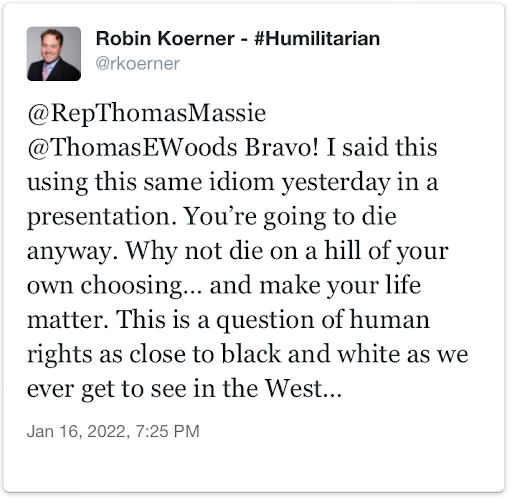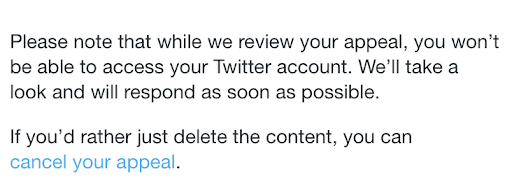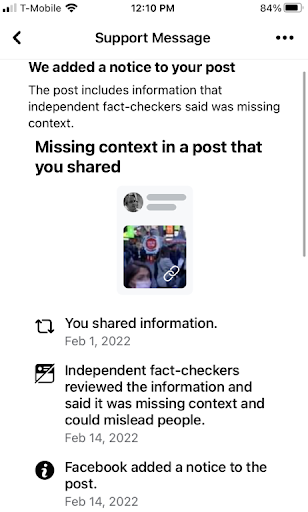Twitter Demanded that I Tell a Lie
This is the most censorious time of my life.
Considering how old I am, that’s saying something – but not anything that will surprise anyone who isn’t rooting for the censors.
But now, returning to an age of “just censorship” seems like a return to the good ol’ days – for compelled speech is now the norm. It’s not only the government that tells us what we must say: Big Tech is at it too.
I can barely believe I am about to write this – but here it is.
Twitter has demanded that I tell a lie before it will let me post on its platform.
That probably sounds extremely hard to believe.
The story goes thus. Twitter suspended my account and told me they would reinstate it immediately if I electronically signed a statement that I had violated their terms and conditions, even though I had not done so (and Twitter had provided no evidence that I had done so).
George Orwell is turning in his grave, and he is probably rather glad he is there.
How did I find myself in this strange situation?
I replied to a Tweet by Congressman Thomas Massie, enthusiastically agreeing with (from memory) what he had said about the issue of forced compliance with mandates that violate bodily autonomy – specifically, that this was a hill worth dying on.

Coincidentally, I had used the same words as he about the same topic in a presentation that I had given only the preceding weekend – and so I enthusiastically endorsed his comment with my own, shown here.
My account was suspended soon thereafter for “harassment” or “threatening harm.” The first thing that bears mention, of course, is the idiocy of the suspension, since this was a Tweet of support, which is rather the opposite of harassment or a desire to harm. Such is obvious to any native reader or speaker of English who understands the idiom “die on a hill” and has the comprehension skills of a young teenager.
Twitter gave the option to appeal, which I did.
I was then presented with this message.

I was happy to wait. All that would be required for my appeal to be successful was obviously that an English speaker reads what I wrote and (presumably) hits a button or checks a box. How long can that take? I put Twitter’s error down to a rather dumb algorithm or an non-English speaker who flagged my reply to Massie on account of the words, “You’re going to die anyway… “ which triggered something or someone because the rest of the sentence, Tweet and thread (in other words, the context, which will meet again below) were all ignored.
So I waited.
And I waited.
After a couple of weeks of no communication from Twitter whatsoever, I returned to the site and clicked the “cancel your appeal” link. After all, my Tweet was not important. It didn’t matter if I deleted it and rewrote it in a way that didn’t fall afoul of the unfit-for-purpose algorithm.
It turned out, however, that Twitter’s statement that I could “just delete the content” was false. In fact, Twitter had eliminated the option for me “just to delete the content” – something that all of its active users are always free to do.
Instead, Twitter even now will only allow me to delete the content if I admit that I violated its terms.
Accordingly, I wrote to the company, telling them that they are free to delete the Tweet that they have misunderstood – but I will not tell a lie about violating its terms. And why, by the way, I asked, do they want me to do so?
One whole month after this nonsense began, Twitter has not responded to my appeal, my question or, indeed, any of my communications about the matter.
For a corporation – let alone another human being – to think that it can dictate to someone his own intent and offer a service in exchange for a lie is an absurdity and a display of the deepest and darkest arrogance.
I wonder if Twitter is not only demanding a lie, but also telling a lie – when it tells me that it is reviewing my appeal. After all, it has failed to respond to all my communications for as long as I’ve refused to tell the lie demanded of me.
It’s starting to look as if the company does not really review appeals, but only pretends to? Perhaps, in reality, its suspensions are indefinite, continuing until the suspendee caves in and signs the false confession.
Is there a Twitter insider who can enlighten me?
Next to this, Facebook looks like a mere also-ran when it comes to controlling opinions – but it is learning fast, and rapidly building all the tools necessary to turn the site into an online Oceania.
Last week, Facebook censored one of my posts thusly.

As a philosopher of science with a particular interest in epistemology, I would need days to write the article that covers everything that is wrong with what Facebook is doing here – and that’s not because I think they’re wrong about missing context.
Rather, they’re committing the exact error they’re claiming to correct. Facebook does not slap this message on all posts that could give an impression at odds with Truth for lack of context – which is a huge proportion of social media posts.
Therefore, the intended and actual effect of such censorship is not driven by the thing claimed (protecting us from being misled by missing content): it is driven by the choice of posts to be examined for potential censorship in the first place. And to understand that, you need to know – guess what – the context of its so doing.
Do I even need to tell you what this post was about? I am sure you can guess. It was about the efficacy of lockdowns – and that is why it was targeted for potential (and ultimately, actual ) censorship.
Lest anyone think that my intention was to mislead (it never is), the entire text of my post was, “I hope we’re all following the science.”
Around the same time, I posted a cartoon about Brexit that was entirely without the context that provided its correct meaning, and Facebook didn’t even notice it. (I can say the same thing about hundreds of other posts.) Facebook only censors content on topics about which it wishes to influence people’s opinions: something that the company is deciding upon unilaterally.
Once they do that, they should be recognized for that reason as publishers and held liable accordingly.
Google / YouTube
Last but not least, there is that other company Google, with its old motto – now a bad joke – “Don’t Be Evil”.
A few weeks ago, I started recording a new podcast with a dear friend of mine, called “From the Outside In.” The title has a double meaning. My co-host and I are French-born and British-born naturalized American citizens and patriots. Not only, then, are we “from the outside (France and the UK) in (USA)” – but also our perspectives are “from the outside in.” We comment on American politics and culture in ways informed by our experiences in other parts of the world.
Our first show was a short Intro, explaining our purpose. Our second presented a discussion of Covid mandates. We are not controversialists. We both have graduate degrees. We both have political experience. And we both love this country.
But YouTube took it down almost as soon as we put it up.
It told us we were violating guidelines.
Rubbish.
I’ve posted probably over 100 YouTube videos in my time and have never violated the company’s terms – just as I have never violated the Twitter terms and conditions either.
As a result, Ismaine (my friend) and I have put our show up on Rumble.
We have gone beyond censorship. I have become a minority by not only refusing to be silent – but also by refusing to lie.
It’s as if not to be censored is not even to try. In my lifetime, society has been sufficiently remade to make me one of the marginals. Millions of people celebrate that. If they did not, we could not be here. I think I am going to start using that expression – one of the marginals – and using it, if you’ll excuse me, with just a little dash of moral pride.